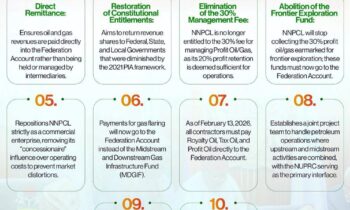Electricity To Cost Between N150 To N300 Per Kilowatts Hour
…MAN Says Cost of Production will Soar
… will not translate to improved supply
Nigerians will start to pay between N150 to N300 per kilowatts hour of electricity as from July 1st, 2023. This is even as the Manufacturers Association of Nigeria MAN has enumerated the impacts of the proposed 40 percent tariff increase on Nigerians if it is implemented.
At the moment, Band C which presently goes for about N40 Per Killowatts Hour may be increased to about N100 Per Killowatts Hour. While Band A which is presently at about N56 Naira Per Kilowatts Hour may be jerked up to about N150 Per Kilowatts Hour
According to Kola Olubiyo, President, of Nigeria’s Consumers Protection Network, he said: “What it means technically speaking, is that electricity tariff rate is now is going to be floated and it will be Market driven as Naira / Dollars Exchange rates will now be subjected to a Free Market Free falls
With high exchange rate volatility, in the next few days, Electricity Tariff may go for between a Minimum Baseline of One Hundred Naira ( N100 ) and a maximum threshold of three Hundred Naira ( N300 ) Per Kilowatts Hour.”
He stated further, that as sad as it is, this shall not translate into any significant improvement in reliable electricity Supply nor translates into upscale in efficient service delivery due to obsolescence of critical power grid infrastructure, Technical and Commercial Losses and poor culture of market remittances, grid constraints amongst others.
Already some of the electricity distribution companies have enjoined Nigerians to load their Pre Paid Meters ( PPM ) in Advance. Those with financial means should endeavor to vend their Pre Paid Meters with some token in advance.
A public service announcement by Abuja Electricity Distribution Company stated: “Dear Valued Customers, effective from July 1st, 2023, please be informed that there will be an upward review to the electricity tariff influenced by the fluctuating exchange rate.
Under the MYTO 2022 guidelines, the previously set exchange rate of N441/$ may now be revised to approximately N750/$ which will have to impact on the tariff associated with the electricity consumption.
For customers with Band C, with supply hours ranging from 12 to 16 hours per day, the new tariff base is expected to be N100 per kilowatt hour (KW/h). While Bands A with 20 hours and above and Band B with 16 to 20 hours will experience comparatively higher tariffs
For Customers with prepaid meters, we encourage you to consider purchasing bulk energy units before the end of this month as this will allow you to take advantage of the current rates and potentially make savings before the new tariffs come into effect. For those on postpaid estimated billion, a significant increment is imminent in your monthly billing”
MAN Reaction
Reacting to the issue, the Manufacturers Association of Nigeria (MAN) through Segun Segun Ajayi-Kadir, its director general stated that as a matter of fact, a further rise in electricity tariff could lead to the following:
- Costs of production will soar: Higher electricity tariffs will directly increase the cost of production for manufacturers. Already, we have energy constituting between 28-40% of the cost structure of manufacturing industries. You can imagine the impact on manufacturing industries that are energy-intensive such as metal processing, heavy machinery, and chemicals manufacturing.
- Profit margins will reduce: A spike in the electricity tariff will erode the profit margin of the manufacturers and reduce their ability to expand operations and create new jobs
iii. High probability of activities paralysis: This is a definite possibility among small and medium-sized enterprises (SMEs) who are unable to accommodate the higher price.
- Potential decrease in the revenue collectible by the government: The hike in electricity tariff will reduce the manufacturers’ profitability and by extension the quantum of taxes and fees payable to the three tiers of Government. Manufacturers remain the largest income taxpayer in the country. Therefore, in the event of poor income generation due to high costs of production, the government purse will suffer.
. Manufacturers will ultimately pass on the additional cost to the consumers of their products: This will increase the cost of local made products in the market and complicate the rising inflation rate in the country.
- Recession of manufacturing activities: An increase in electricity tariff will reduce the purchasing capability. One of the resulting effects is the fall in demand and recession of manufacturing activities over time.
vii. The sector’s competitiveness will definitely worsen: The high cost of the products will make locally produced items less competitive when compared with imported alternatives. This is also true of exports, as Nigerian products may find it more challenging to penetrate foreign markets. Such a move will restrict our export earnings because it will be impossible to compete with our counterparts in the global trading environment.
viii. High probability of outward investment. Some manufacturing industries may consider shifting production to other economies with lower electricity tariffs and guaranteed availability.
Manufacturers Expectations
The expectation of the manufacturers is that the Federal Government and NERC will ensure improvement in electricity generation, transmission and distribution that will lead to adequate and reliable electricity supply in the country, rather than increasing the tariff on the mere 4000MW to meet all revenue needs of stakeholders in the electricity supply industry.
Government should ensure that at least 90% of electricity consumers are metered to ensure consumption reflective electricity bill payment, formulate electricity policies that will aid investment in the energy industry to increase generation capacities that will usher in large-scale production of electricity and ensure effective implementation of the recent Electricity Act (2023) that is aimed at increasing the electricity supply in the country.
Specifically:
- There is an urgent need for the diversification of energy sources and intensifying infrastructure investment in the power sector;
- Eradicate outrageous bills by closing the metering gap through the liberalization of ultimate users’ access to effective mass metering;
iii. Ensure the connection of all consumers to the electricity grid to avoid free riding and unfair charges on the few connected consumers;
- Work on efforts to increase the electricity supply base in order to distribute the total cost among a high number of consumers at a much lower unit cost;
- States and private investors should rise up to the challenge by taking advantage of the Electricity Act 2023 to eradicate the energy poverty of their people.
In conclusion
As it is today, the manufacturing sector, which is the engine of growth, is still struggling due to the inclement production environment in Nigeria. The expectation is that Government will engage in extensive and intensive consultations with the manufacturers; focus on measures that will salvage the sector and halt the trend of shutdown of factories, knowing the implications and the multiplier effects on employment and the economy. Care should be taken to avoid introducing burdensome measures that will further strangulate the manufacturing sector and the whole economy.





